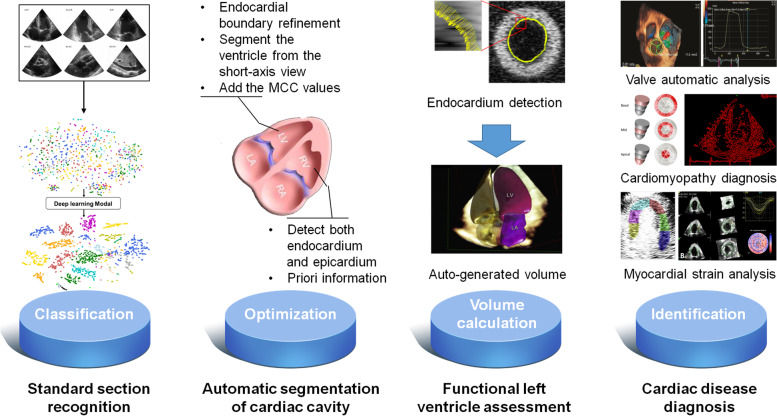CD Biosynsis is a leader in using artificial intelligence to advance enzyme engineering. With a professional team of scientists, we have long been dedicated to providing researchers with targeted enzyme evolution and design services. As artificial intelligence has been widely used in various fields in recent years, our EnzymoGeniusTM platform also applies artificial intelligence in the high-throughput enzyme screening process to accelerate the discovery of enzyme mutants.
Overview
A key point in the AI model training process is to assess when AI model training should be stopped. Therefore, in high-throughput enzyme screening progress, how to find a suitable detection strategy to evaluate the AI model is a critical issue. Nowadays, the fluorescence signal-based detection is the most commonly used method in enzyme mutation library screening.
 Fig. 1. Application of AI in echocardiography. (Zhou J, et al., 2021)
Fig. 1. Application of AI in echocardiography. (Zhou J, et al., 2021)
Our Services
Our EnzymoGeniusTM platform is dedicated to the directed evolution and design of enzymes. Combined with our advantages in artificial intelligence, we are able to provide our customers with artificial intelligence predictive screening of high-throughput enzyme mutant screening libraries.
For high-throughput screening of enzymes, the specific assays vary depending on the particular enzyme. There are three main types of screening assays, including radioactivity-based assays, fluorescence-based, and spectrophotometric colorimetric assays.
- Radioisotope Assay
The radioisotope assay is one of the classic methods applied to high-throughput screening tests. There are many advantages of using the radioisotope method, firstly, it is a direct detection method with less interference from other factors; secondly, radioisotopes are highly sensitive and the test results are very accurate.
- Fluorescence Assay
Fluorescence signal-based assay is currently the most common assays for high-throughput screening. Based on its high sensitivity, the fluorescence assay is able to perform the quantitative detection of enzyme activity reliably. Together with the fact that a large number of mature fluorescence signal detection instruments have been put into use, it makes fluorescence assay become one of the most popular assays in high-throughput enzyme library screening.
- Spectrophotometric Assay
Spectrophotometric assay is a method to qualitatively and quantitatively analyze a substance by determining its absorbance at a specific wavelength or a certain range of wavelengths, which is also a classical method for enzyme activity detection. When using spectrophotometric assay for high-throughput screening, a suitable reaction substrate or product with a change in light absorption properties in the visible wavelength range is usually designed and selected according to the specific type of enzymatic reaction.
Our Advantages
- Diversified Assays: For the specific needs in different enzyme variant screening processes, we will screen the suitable assays according to the specific situation, so as to provide a reliable AI model to evaluate the enzyme variant screening program.
- Customized Services: Based on the characteristics of different enzymes, we are able to design enzyme activity assays to meet the unique needs of researchers for enzyme variant screening.
- High-quality Services: we have a team of skilled and experienced scientists with in-depth knowledge of enzyme assay to provide comprehensive service to our customers. We can provide you with professional consulting service before the project and reliable support service after the sale.
With a professional scientific team, CD Biosynsis has been dedicated to providing researchers with enzyme directed evolution and design services. Combined with the advantages of Artificial Intelligence, we use AI to guide enzyme variant discovery and screen for ideal enzyme variants. If you are interested in the exclusive customization service for enzymes, please do not hesitate to contact us.
Reference
- Zhou, J.; et al. Artificial intelligence in echocardiography: detection, functional evaluation, and disease diagnosis. Cardiovasc Ultrasound. 2021, 19(1):29.

































 Fig. 1. Application of AI in echocardiography. (Zhou J, et al., 2021)
Fig. 1. Application of AI in echocardiography. (Zhou J, et al., 2021)